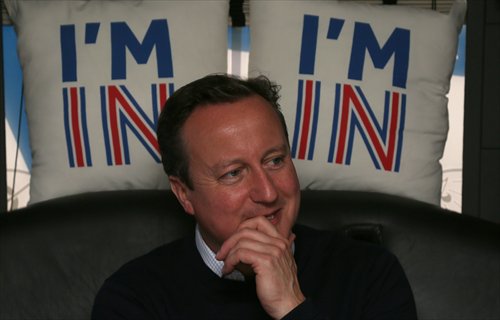HOME >> WORLD
Brexit rivals race for votes on eve of poll
Source:Reuters Published: 2016/6/23 0:18:00
Result still too close to call as EU leaders warn of exit’s dire consequences

British Prime Minister David Cameron reacts as he travels in his campaign bus from Bristol, south-west England, on Wednesday, as he campaigns to avoid a Brexit ahead of Thursday's EU referendum (see stories on page 7 and 14). Photo: AFP
British Prime Minister David Cameron and his Euroskeptic opponents made final pitches to wavering voters on Wednesday on the eve of a defining referendum on European Union (EU) membership as the outcome remains too close to call.
"It's very close; nobody knows what's going to happen," Cameron told Wednesday's Financial Times, with opinion polls showing the rival camps neck and neck.
The vote, which echoes the rise of populism elsewhere in Europe and in the US, will shape the future of Europe and could unleash turmoil on financial markets if "Leave" emerges victorious.
European Commission chief Jean-Claude Juncker warned there would be no more renegotiation regardless of Thursday's result, after EU leaders reached a new settlement for Britain in February. French President Francois Hollande said a vote to leave would carry a "very serious" risk of ending British access to the EU's prized single market.
The referendum will take place a week after the murder of ardently pro-EU lawmaker Jo Cox shocked the country, raising questions about the tone of the increasingly bitter campaign.
Much of the heated debate has boiled down to two issues: the economy and immigration.
The City of London's financial center, the International Monetary Fund and the majority of British business leaders back Cameron and his "Remain" camp's stance that leaving the EU would plunge Britain into recession, costing jobs and raising prices. But supporters of a so-called Brexit have struck a chord with many voters by saying Britain would regain control of immigration if it were to cut itself loose from the bloc.
Both camps have been accused of using unfounded assertions and scare tactics. "Remain" campaigners have accused their opponents of resorting to the politics of hate; "Leave" says "Remain" has run "project fear" to scare voters about the economic risks.
Both sides hit the road and the airwaves to appeal to the large number of undecided voters who will be ultimately determine the outcome, along with the level of turnout.
"It's our last chance to sort this out and take back control," said former London mayor Boris Johnson, the main leader of the "Leave" campaign and bookmakers' favorite to replace Cameron in the event of Brexit.
"If we don't vote to leave tomorrow, we will remain locked in the back of the car, driven in an uncertain direction, frankly, to a place we don't want to go and perhaps by a driver who doesn't speak the very best of English," he said.
He was flying around Britain in a helicopter to spread his message, making an unashamed play to British patriotism by declaring that Thursday could be Britain's "independence day."
Posted in: Europe